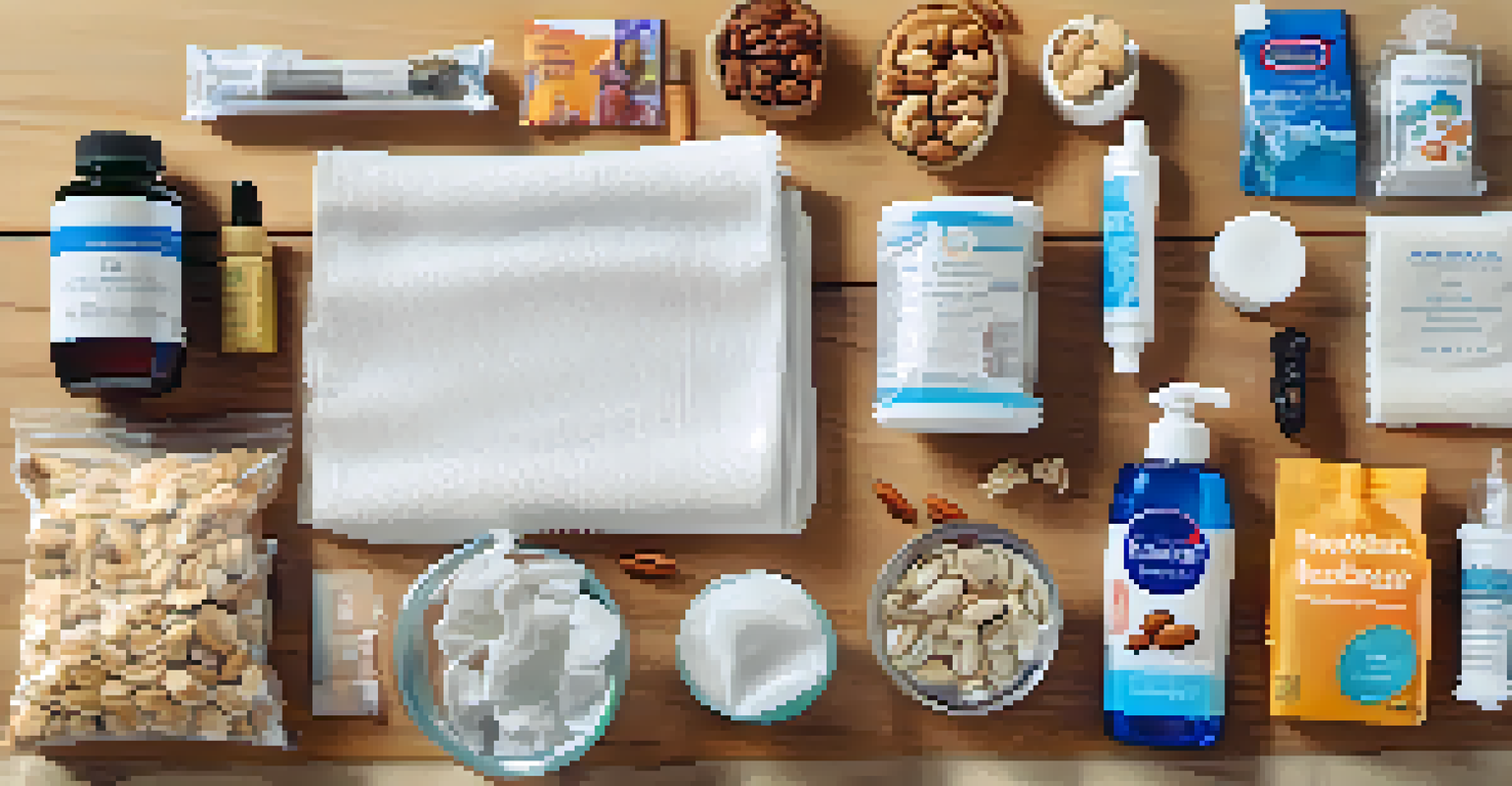Traveling During Cold and Flu Season: Health Tips

Understanding Cold and Flu Season: What to Expect
Cold and flu season typically peaks in fall and winter, bringing a wave of sniffles, coughs, and fevers. When traveling during this time, it's crucial to be aware of the symptoms and how they spread. Understanding the difference between a cold and the flu can help you respond appropriately if you or someone around you falls ill.
An ounce of prevention is worth a pound of cure.
Flu symptoms are often more severe and can include high fever, body aches, and extreme fatigue, while colds usually present with milder symptoms like a runny nose or sore throat. Being informed helps you take proactive measures, such as getting the flu vaccine ahead of your trip. This knowledge not only protects you but also those around you, especially in crowded places like airports.
Preparation is key. Familiarize yourself with local health advisories at your destination, and keep a travel health kit handy. This way, you can address any symptoms early on and reduce the risk of spreading illness to fellow travelers.
Pack Smart: Essential Health Supplies for Your Trip
Packing smart can be your first line of defense against cold and flu. Start with basic items like hand sanitizer, disinfectant wipes, and tissues. These supplies will help you maintain hygiene and prevent the spread of germs, especially in public spaces like airplanes and hotels.

Consider adding over-the-counter medications such as pain relievers, throat lozenges, and decongestants to your travel kit. If you want to go the extra mile, include a thermometer to monitor your temperature. This way, you’ll be prepared for any symptoms that may arise during your travels.
Protect Yourself During Travel
Understanding cold and flu symptoms and taking proactive measures, like getting vaccinated, can help keep you and others healthy while traveling.
Don't forget about hydration! Bring a reusable water bottle and drink plenty of fluids to keep your immune system strong. Staying hydrated can help your body fend off illness and feel better overall, making your journey more enjoyable.
Practice Good Hygiene While Traveling
Good hygiene practices are essential when traveling, especially during cold and flu season. Regularly washing your hands with soap and water for at least 20 seconds can significantly reduce your risk of getting sick. If soap isn't available, hand sanitizer with at least 60% alcohol is a good alternative.
Take care to get what you like or you will be forced to like what you get.
Be mindful of the surfaces you touch in public areas. Airplane tray tables, armrests, and bathroom doorknobs can harbor germs. Use disinfectant wipes to clean these surfaces before use, and avoid touching your face as much as possible to minimize the risk of transferring germs.
Also, consider wearing a mask in crowded places, especially if you’re feeling under the weather or if you notice many people around you are coughing or sneezing. This simple step not only protects you but also shows consideration for others’ health.
Stay Healthy with a Balanced Diet on the Road
Maintaining a balanced diet while traveling can significantly impact your immune health. It's tempting to indulge in fast food during long trips, but opting for healthier choices can keep your body strong. Fresh fruits, vegetables, and whole grains provide essential nutrients that support your immune system.
If you’re flying, consider packing healthy snacks like nuts, protein bars, or dried fruit. These can help you avoid unhealthy airport food and keep your energy levels steady. Staying nourished will not only help you feel better but also keep your body prepared to fight off any germs.
Stay Prepared with Essentials
Packing health supplies such as hand sanitizer, over-the-counter medications, and healthy snacks can enhance your immunity and keep you well on the road.
Additionally, if you're traveling internationally, be cautious about street food and ensure you’re eating from reputable sources. This vigilance can help you avoid foodborne illnesses that can easily throw a wrench in your travel plans.
Get Plenty of Sleep: A Key to Staying Healthy
Sleep is your body’s natural defense system, and it’s crucial during travel, especially in cold and flu season. Lack of sleep can weaken your immune system, making you more susceptible to illness. Aim for at least 7-8 hours of quality sleep each night, even if you're on the go.
If you’re traveling across time zones, try to adjust your sleep schedule a few days before your trip. This can help minimize jet lag and ensure you're well-rested upon arrival. Also, consider creating a calming bedtime routine to promote better sleep, even in unfamiliar environments.
Remember, rest isn’t just about recovery; it’s also about enjoying your travel experience. When you’re well-rested, you’re more alert, happier, and ready to explore your destination. Prioritize your sleep, and your body will thank you for it.
Stay Active: Exercise While Traveling
Staying active while traveling can boost your energy levels and enhance your immune system. Even if you're on a tight schedule, finding ways to incorporate physical activity into your day can be beneficial. Simple activities like walking, stretching, or taking the stairs instead of the elevator can make a difference.
Consider exploring your destination on foot or renting a bike to see more sights while getting some exercise. Not only will this keep you active, but it will also allow you to experience the local culture up close. Plus, fresh air and movement can do wonders for your mood.
Know When to Seek Help
Recognizing severe symptoms and knowing where to find medical assistance can ensure you receive timely treatment while traveling.
If you're staying at a hotel, take advantage of the gym facilities or join a local fitness class. Keeping your body moving helps reduce stress and can improve your overall travel experience, making those long flights and car rides feel a bit easier.
Know When to Seek Medical Help While Traveling
Knowing when to seek medical help while traveling is crucial, especially if you start feeling unwell. If you experience severe symptoms, such as high fever or difficulty breathing, don’t hesitate to find a local doctor or visit an emergency room. Most destinations have healthcare facilities that can assist you.
It’s also wise to research healthcare options before you travel. Check if your health insurance covers medical treatment abroad and if there are specific clinics or hospitals recommended for tourists. Having this information at hand can save you time and anxiety if a health issue arises.

Lastly, consider carrying a basic travel insurance policy that covers health-related expenses. This extra layer of protection can help you navigate any unexpected health issues while ensuring that you receive the care you need without excessive costs.